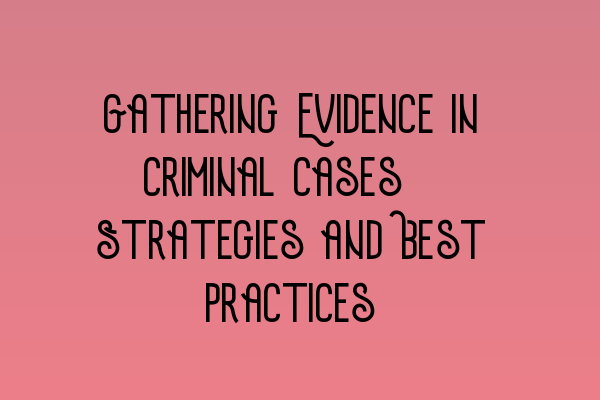Gathering Evidence in Criminal Cases: Strategies and Best Practices
When it comes to criminal law cases, gathering evidence is a crucial aspect that can make or break the outcome of the trial. As a criminal law practitioner, understanding the strategies and best practices for gathering evidence is essential to building a strong case for your clients.
Here at SQE Criminal Law & Practice Law UK, we specialize in providing comprehensive legal knowledge and expertise. In this article, we will discuss various strategies and best practices that will help you successfully gather evidence in criminal cases.
The Importance of evidence gathering
In any criminal case, evidence plays a vital role in establishing the guilt or innocence of the accused. It forms the foundation of the legal arguments presented to the court and allows the jury or judge to make informed decisions.
By gathering relevant and admissible evidence, you can strengthen your case, challenge the prosecution’s claims, and ensure that justice is served. It is crucial to be meticulous and thorough in the process of evidence gathering to achieve the best possible outcome for your client.
Evidence Gathering Strategies
1. Conducting thorough interviews: Interviewing witnesses, victims, and other individuals involved in the case is a fundamental strategy for evidence gathering. Carefully draft your questions and conduct the interviews in a professional and ethical manner to obtain valuable testimonies.
2. Documenting physical evidence: Physical evidence such as photographs, videos, fingerprints, DNA samples, and forensic reports can provide strong support for your case. Ensure that all relevant physical evidence is properly documented, labeled, and preserved to maintain its integrity.
3. Utilizing expert witnesses: Expert witnesses can provide specialized knowledge and opinions to support your case. They can help interpret complex evidence, provide professional testimony, and assist in establishing the credibility of your client’s claims.
4. Leveraging technology: In today’s digital age, technology can play a crucial role in evidence gathering. Emails, text messages, social media posts, and surveillance footage can all serve as valuable evidence. It is important to be familiar with the relevant laws regarding the admissibility of digital evidence in court.
Best Practices for Evidence Gathering
1. Maintaining a detailed case file: Keep a well-organized case file that includes all relevant documents, witness statements, and evidence. This will facilitate easy access to information and ensure that nothing is overlooked during trial preparation.
2. Collaboration with law enforcement agencies: Work closely with law enforcement agencies to gather evidence effectively. Establish good relationships, communicate regularly, and ensure that all relevant information is shared promptly.
3. Adhering to legal and ethical standards: It is essential to gather evidence in a lawful and ethical manner. Familiarize yourself with the relevant laws and professional codes of conduct to ensure that your actions do not violate any legal or ethical principles.
4. Regularly reviewing and updating evidence: As the case progresses, consistently review and update the evidence. This will help identify any gaps or inconsistencies that need to be addressed. Stay proactive in seeking additional evidence or reassessing existing evidence to strengthen your case.
Conclusion
Gathering evidence in criminal cases requires a strategic approach and adherence to best practices. By conducting thorough interviews, documenting physical evidence, utilizing expert witnesses, and leveraging technology, you can build a strong foundation for your case.
At SQE Criminal Law & Practice Law UK, we are committed to providing comprehensive legal training and resources. To further enhance your knowledge and skills, we recommend exploring our related articles:
- Essentials of Consideration: Understanding the Backbone of Contracts
- Mistake in Contract Law: Unraveling the Impact on Agreement Validity
- Counter-offers: The Art of Negotiating in Contract Law
- SQE Workshops on Contract Law: Strengthening Your Knowledge and Skills
- Deconstructing Exclusion Clauses in Contracts: What You Must Know
By expanding your legal knowledge across different areas of law, you can enrich your understanding and enhance your overall legal practice.
Remember, the strength of your case lies in the evidence you gather. By implementing effective strategies and following best practices, you can navigate the complex world of criminal law and bring justice to your clients.
